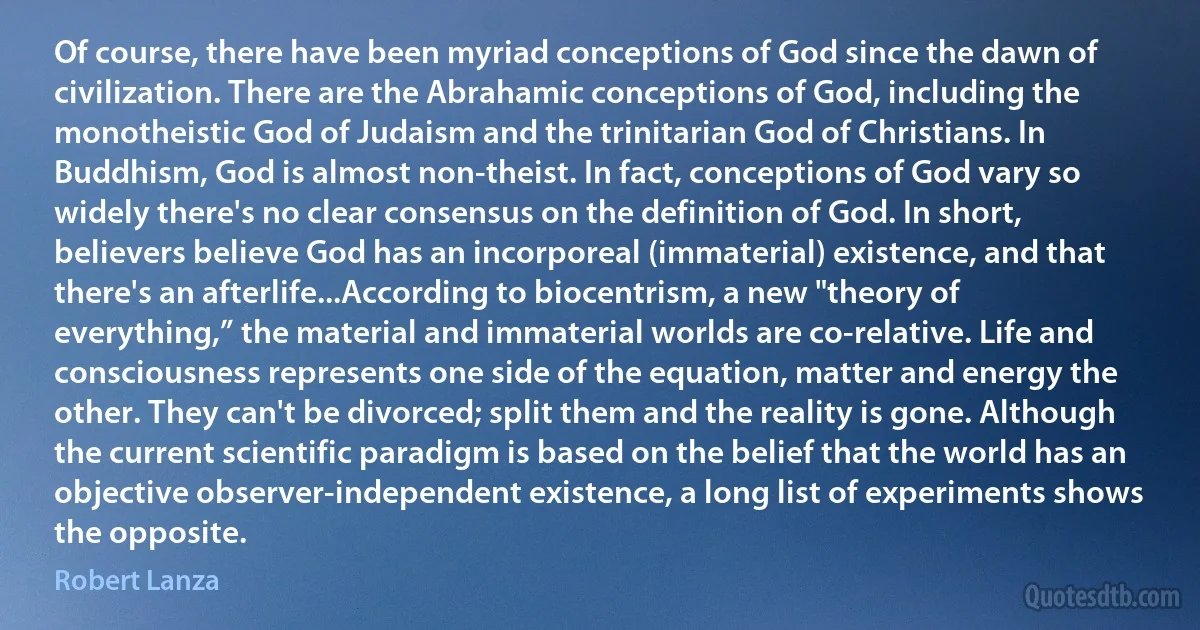
Of course, there have been myriad conceptions of God since the dawn of civilization. There are the Abrahamic conceptions of God, including the monotheistic God of Judaism and the trinitarian God of Christians. In Buddhism, God is almost non-theist. In fact, conceptions of God vary so widely there's no clear consensus on the definition of God. In short, believers believe God has an incorporeal (immaterial) existence, and that there's an afterlife...According to biocentrism, a new "theory of everything,” the material and immaterial worlds are co-relative. Life and consciousness represents one side of the equation, matter and energy the other. They can't be divorced; split them and the reality is gone. Although the current scientific paradigm is based on the belief that the world has an objective observer-independent existence, a long list of experiments shows the opposite.
Robert LanzaRelated topics
abrahamic almost believe buddhism clear consensus course dawn definition equation everything judaism life matter myriad objective paradigm short side split world afterlifeRelated quotes
I reproach myself for a gross error. But I would reproach myself more if I had persisted in an error after observations revealed it clearly to be that. I made a deal of money in the late 1940s on the bull side, ignoring Satchel Paige's advice to Lot's wife, "Never look back.” Rather I would advocate Samuelson's Law: "Always look back. You may learn something from your residuals. Usually one's forecasts are not so good as one remembers them; the difference may be instructive.” The dictum "If you must forecast, forecast often,” is neither a joke nor a confession of impotence. It is a recognition of the primacy of brute fact over pretty theory. That part of the future that cannot be related to the present's past is precisely what science cannot hope to capture. Fortunately, there is plenty of work for science to do, plenty of scientific tasks not yet done.

Paul Samuelson
First of all I want to remind you of the essential features of models. In my opinion they are: (i) drawing up a list of the variables to be considered; (ii) drawing up a list of the equations or relations the variables have to obey and (iii) testing the validity of the equations, which implies the estimation of their coefficients, if any. As a consequence of especially (iii) we may have to revise (i) and (ii) so as to arrive at a satisfactory degree of realism of the theory embodied in the model. Then, the model may be used for various purposes, that is, for the solution of various problems. The advantages of models are, on one hand, that they force us to present a "complete" theory by which I mean a theory taking into account all relevant phenomena and relations and, on the other hand, the confrontation with observation, that is, reality. Of course these remarks are far from new.

Jan Tinbergen
Third Theory.-According to this theory, there is nothing in the whole Universe... that is due to chance; everything is the result of will, intention, and rule. It is a matter of course that he who rules must know. The Mohametan Ashariyah adhere to this theory, notwithstanding evident absurdities implied in it. ...The Ashariyah were therefore compelled to assume that motion and rest of living beings are predestined, and that it is not in the power of a man to do a certain thing or to leave it undone. ...It follows also from this theory, that precepts are perfectly useless, since the people to whom any law is given... can neither do what they are commanded nor abstain from what they are forbidden. ...According to this theory, it must also be assumed that the actions of God have no final cause. All these absurdities are admitted by the Ashariyah for the purpose of saving this theory.

Maimonides
We Europeans have to toil to achieve it, at least as a transitional stage, for it is what we feed our dreams upon. These Orientals [from India] have it in their blood, perhaps because they spend their lives I the sun. We poor wretched Europeans must sacrifice body and soul for even a shadow of it.. .It is not a question of trying to reproduce objective features, only of good practice for the fingers and for the perceptive faculty, and that too is very useful. You must have read how Van Gogh was always getting his brother to send him drawings to copy. And how Rembrandt used to copy Indian an Italian pictures. Not of course, because they were short of material, but to get 'du corps'. So one should be always drawing.. .Oh, you'd love the Indians. The pure, Aryan Indians, not those one could see in Berlin, whose forms had become rigid and sterile through mingling with the Chinese.

Ernst Ludwig Kirchner
I dinnae Tam, ah jist dinnae. Life's boring and futile. We start oaf wi high hopes, then we bottle it. We realize that we're aw gaunnae die, withoot really findin oot the big answers. We develop aw they long-winded ideas which jist interpret the reality ay oor lives in different weys, withoot really extending oor body ay worthwhile knowledge, about the big things, the real things. Basically, we live a short, disappointing life; and then we die. We fill oor lives up wi shite, shite like joabs n relationships, tae delude ourselves intae thinkin that it isnae aw totally pointless. Smack's an honest drug, because it strips away these delusions. It's the only really honest drug. It disnae alter yir consciousness. It jist gies ye a hit and a sense ay well-being. After that, ye see the misery ay the world as it is, and ye cannae anesthaetise yirsel against it.

Irvine Welsh
